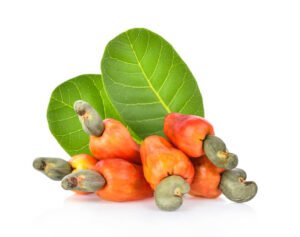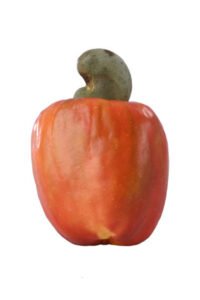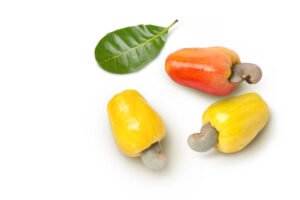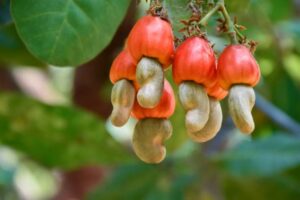Cashew apples, often overshadowed by their more popular nut counterparts, are a hidden gem in the world of exotic fruits. While cashew nuts have long been celebrated for their nutritional value, the cashew apple, the fleshy accessory fruit attached to the nut, is equally deserving of attention. Packed with essential nutrients, this often overlooked fruit offers a range of health benefits supported by scientific research.
Nutrient Profile
 Cashew apples boast a rich nutritional profile, providing a good source of vitamins and minerals. According to a study published in the “International Journal of Food Sciences and Nutrition,” cashew apples are particularly high in vitamin C, a powerful antioxidant known for its immune-boosting properties. Additionally, they contain significant amounts of dietary fiber, promoting digestive health and aiding in weight management.
Cashew apples boast a rich nutritional profile, providing a good source of vitamins and minerals. According to a study published in the “International Journal of Food Sciences and Nutrition,” cashew apples are particularly high in vitamin C, a powerful antioxidant known for its immune-boosting properties. Additionally, they contain significant amounts of dietary fiber, promoting digestive health and aiding in weight management.
Antioxidant Properties
Research has indicated that cashew apples exhibit strong antioxidant activity. Antioxidants play a crucial role in neutralizing free radicals within the body, which are implicated in various chronic diseases and the aging process. A study published in the “Journal of Food Science and Technology” highlighted the presence of bioactive compounds in cashew apples, contributing to their antioxidant potential.
Continuing with the exploration of the antioxidant properties of cashew apples, it’s noteworthy to emphasize the unique composition of these tropical pseudofruits. Apart from their rich vitamin C content, cashew apples boast a distinctive array of phytochemicals, such as polyphenols and carotenoids, which contribute significantly to their robust antioxidant potential.
This diverse combination of bioactive compounds not only aids in free radical scavenging but also sets cashew apples apart as a flavorful and healthful addition to one’s diet. The interplay of these compounds showcases the intricacies of nature’s pharmacy encapsulated within the vibrant hues of cashew apples, offering both a gustatory delight and a nutritional boon.
Heart Health
 Consuming cashew apples may contribute to heart health due to their potassium content. Potassium is essential for maintaining healthy blood pressure levels and supporting cardiovascular function. A study in the “American Journal of Clinical Nutrition” emphasized the positive correlation between potassium intake and a reduced risk of hypertension and stroke.
Consuming cashew apples may contribute to heart health due to their potassium content. Potassium is essential for maintaining healthy blood pressure levels and supporting cardiovascular function. A study in the “American Journal of Clinical Nutrition” emphasized the positive correlation between potassium intake and a reduced risk of hypertension and stroke.
In addition to their rich potassium content, cashew apples bring forth unique attributes that contribute to cardiovascular well-being. Notably, these exotic pseudofruits are also endowed with dietary fiber, a crucial component that aids in maintaining optimal cholesterol levels. A combination of potassium and dietary fiber in cashew apples synergistically supports heart health by not only regulating blood pressure but also promoting a healthy lipid profile.
Anti-Inflammatory Effects
Cashew apples contain compounds with anti-inflammatory properties, as suggested by research published in the “Journal of Agricultural and Food Chemistry.” Chronic inflammation is linked to various health issues, including arthritis and heart disease. Including anti-inflammatory foods, such as cashew apples, in the diet may contribute to overall well-being.
Continuing the discussion on the anti-inflammatory effects of cashew apples, it’s worth highlighting the distinctive properties that set these tropical pseudofruits apart. The compounds found in cashew apples not only showcase anti-inflammatory potential but also boast a unique combination of antioxidants, notably polyphenols and flavonoids. These specialized antioxidants contribute to the fruit’s ability to combat oxidative stress, a key player in chronic inflammation.
Moreover, the specific anti-inflammatory compounds identified in cashew apples have shown promise in modulating immune responses. This nuanced immunomodulatory effect distinguishes cashew apples as not only anti-inflammatory agents but also potential contributors to immune system balance. As research unfolds, these peculiar attributes position cashew apples as a flavorful addition to a diet aimed at promoting holistic well-being, addressing inflammation, and supporting immune health.
Blood Sugar Regulation
 The fiber content in cashew apples may aid in blood sugar regulation. A study in the “Journal of Nutrition and Metabolism” reported that dietary fiber helps stabilize blood glucose levels, making cashew apples a potentially beneficial addition to the diet for individuals managing diabetes or at risk of developing the condition.
The fiber content in cashew apples may aid in blood sugar regulation. A study in the “Journal of Nutrition and Metabolism” reported that dietary fiber helps stabilize blood glucose levels, making cashew apples a potentially beneficial addition to the diet for individuals managing diabetes or at risk of developing the condition.
Building on the foundation of dietary fiber’s blood sugar-stabilizing prowess, cashew apples present distinctive qualities that make them stand out in the realm of diabetes management. Notably, the low glycemic index of cashew apples ensures a gradual release of sugars, preventing rapid spikes in blood glucose levels. This gradual release aligns with the body’s natural insulin response, offering individuals with diabetes a more controlled and sustainable source of energy.
Furthermore, the presence of antioxidants in cashew apples contributes to their blood sugar regulatory effects. Antioxidants combat oxidative stress, a factor linked to insulin resistance. By incorporating cashew apples into the diet, individuals may not only benefit from the fiber’s stabilizing influence but also harness the antioxidative properties that support overall metabolic health.
Bone Health
Cashew apples contribute to bone health due to their mineral content, including calcium and magnesium. Calcium is essential for maintaining strong bones and teeth, while magnesium plays a role in bone density. Including cashew apples in your diet can complement other sources of these minerals, promoting overall bone health.
Cashew apples boast a unique advantage in promoting bone health with their distinctive mineral profile. Beyond the calcium and magnesium they provide, these tropical delights also contain phosphorus, a vital component for bone mineralization and strength. The synergistic combination of calcium, magnesium, and phosphorus in cashew apples fortifies the skeletal structure, fostering resilience and contributing to long-term bone well-being.
Furthermore, the presence of trace minerals such as copper in cashew apples adds an intriguing dimension to their bone health benefits. Copper is involved in the synthesis of collagen, a key protein in bones and connective tissues. Incorporating cashew apples into your diet not only addresses fundamental mineral requirements but also supports the intricate matrix of bone composition, ensuring a holistic approach to skeletal vitality.
Vision Support
 The presence of vitamin A in cashew apples is beneficial for maintaining healthy vision. Vitamin A is crucial for the proper functioning of the eyes, and a deficiency can lead to vision problems. Consuming foods rich in vitamin A, such as cashew apples, supports eye health and may contribute to preventing age-related macular degeneration.
The presence of vitamin A in cashew apples is beneficial for maintaining healthy vision. Vitamin A is crucial for the proper functioning of the eyes, and a deficiency can lead to vision problems. Consuming foods rich in vitamin A, such as cashew apples, supports eye health and may contribute to preventing age-related macular degeneration.
In addition to the essential vitamin A content, cashew apples offer a distinctive advantage for vision health due to their unique combination of antioxidants. These antioxidants, including compounds like zeaxanthin and lutein found in cashew apples, play a crucial role in shielding the eyes from oxidative stress. This protection contributes not only to the prevention of age-related macular degeneration but also to the overall well-being of the ocular system.
Immune System Boost
Apart from its high vitamin C content, cashew apples contain other immune-boosting compounds. Phytochemicals and antioxidants found in the fruit contribute to a robust immune system. Regular consumption can help the body defend itself against infections and illnesses.
Furthermore, the unique combination of polyphenols in cashew apples exhibits anti-inflammatory properties, aiding in the reduction of chronic inflammation. This distinctive feature sets cashew apples apart, providing a dual-action approach to immune support by not only enhancing the body’s defense mechanisms but also mitigating inflammatory responses.
Additionally, the presence of specific bioactive compounds in cashew apples has been linked to potential antiviral properties, further emphasizing their role in fortifying the immune system against a spectrum of health threats. Embracing the distinctive attributes of cashew apples becomes a flavorful strategy for fostering immune resilience and overall well-being.
Reduced Risk of Anemia
Cashew apples contain iron, a vital component of hemoglobin responsible for transporting oxygen in the blood. Including iron-rich foods in the diet, such as cashew apples, can contribute to preventing iron deficiency anemia and maintaining optimal energy levels.
Furthermore, the iron present in cashew apples comes with a unique advantage. Unlike some iron-rich foods that may be challenging for the body to absorb, the iron in cashew apples is accompanied by vitamin C—a powerful enhancer of iron absorption. This natural synergy not only reinforces the preventive measures against anemia but also optimizes the utilization of iron, ensuring a more efficient boost to hemoglobin production.
Cancer Prevention Potential
 Research suggests that certain compounds present in cashew apples may have anticancer properties. A study in the “Journal of Food Science and Technology” highlighted the potential of cashew apple extracts in inhibiting the growth of cancer cells. However, it’s important to note that further research is needed to fully understand the extent of these benefits.
Research suggests that certain compounds present in cashew apples may have anticancer properties. A study in the “Journal of Food Science and Technology” highlighted the potential of cashew apple extracts in inhibiting the growth of cancer cells. However, it’s important to note that further research is needed to fully understand the extent of these benefits.
The presence of bioactive compounds, including polyphenols and flavonoids, showcases the multifaceted nature of these exotic fruits. These compounds, identified in preliminary studies, exhibit antioxidant properties that may contribute to neutralizing free radicals, thus potentially impeding the initiation and progression of cancer cells.
Furthermore, the exploration of cashew apples in cancer prevention research underscores the importance of uncovering the specific mechanisms behind their inhibitory effects. The interplay of various compounds within cashew apples, combined with their bioavailability and interaction with cellular pathways, forms a captivating avenue for further investigation.
Natural Stress Reliever
Cashew apples contain stress-relieving nutrients such as magnesium and potassium. Both minerals play a role in relaxing blood vessels and muscles, promoting an overall sense of calm. Including cashew apples in your diet may contribute to stress reduction and improved mental well-being.
Moreover, the unique combination of antioxidants in cashew apples, including polyphenols and vitamin C, adds an extra layer of support against oxidative stress—a common contributor to heightened anxiety. These antioxidants work synergistically to combat free radicals, fostering a sense of tranquility and mental clarity.
Additionally, the presence of natural sugars in cashew apples, coupled with a moderate glycemic index, provides a sustained release of energy. This steady energy supply helps prevent blood sugar fluctuations, supporting a balanced mood throughout the day.
Environmental Sustainability
Beyond personal health benefits, the cultivation of cashew apples contributes to sustainable agricultural practices. The cashew tree is hardy and well-adapted to various climates, making it a resilient crop. Additionally, cashew apple processing can provide additional income for farmers, contributing to the economic sustainability of local communities.
Culinary Versatility
Beyond their health benefits, cashew apples offer culinary versatility. They can be consumed fresh, juiced, or incorporated into various dishes. Cashew apple juice, in particular, has gained popularity not only for its refreshing taste but also for its nutritional content. This versatility allows individuals to enjoy the benefits of cashew apples in a manner that suits their preferences and dietary habits.
Digestive Health and Weight Management
The fiber content in cashew apples contributes to digestive health by promoting regular bowel movements and preventing constipation. Moreover, dietary fiber imparts a feeling of satiety, which can assist in weight management efforts. A study in the “European Journal of Clinical Nutrition” emphasized the role of dietary fiber in controlling appetite and supporting weight loss.
Skin Health
The antioxidant properties of cashew apples can extend benefits to the skin. Antioxidants help combat oxidative stress, a common factor in skin aging. Including antioxidant-rich foods in the diet, such as cashew apples, may contribute to maintaining healthy and radiant skin. However, it’s important to note that a holistic approach to skincare involves a combination of a healthy diet, hydration, and proper skincare practices.
Nutritional Value of Cashew Apples (Per 100 grams):
- Calories: Approximately 44 kcal
- Water Content: Around 92 grams
- Protein: About 0.58 grams
- Total Fat: Approximately 0.43 grams
- Saturated Fat: Less than 0.1 grams
- Monounsaturated Fat: 0.095 grams
- Polyunsaturated Fat: 0.121 grams
- Carbohydrates: About 10.2 grams
- Dietary Fiber: Around 0.9 grams
- Sugar: Approximately 5.9 grams
- Vitamins:
- Vitamin C: Approximately 6.7 milligrams (11% of the daily recommended intake)
- Vitamin A: About 0.007 milligrams (1% of the daily recommended intake)
- Vitamin E: Around 0.19 milligrams (1% of the daily recommended intake)
- Minerals:
- Potassium: Approximately 180 milligrams
- Calcium: Around 11 milligrams
- Magnesium: About 8 milligrams
- Phosphorus: Approximately 8 milligrams
- Iron: Around 0.18 milligrams
- Zinc: About 0.07 milligrams
- Sodium: Approximately 3 milligrams
These values are approximate and can vary based on factors such as ripeness and cultivation conditions. Cashew apples are low in calories and fat, rich in water content, and provide essential nutrients such as vitamin C, potassium, and dietary fiber. Including them in your diet can contribute to overall health and well-being.
Conclusion
In conclusion, cashew apples are a delicious and nutritious fruit that offers a myriad of health benefits. From boosting the immune system with vitamin C to supporting heart health through potassium, the scientific literature supports the positive impact of incorporating cashew apples into a balanced diet. As with any dietary change, it’s essential to consult with a healthcare professional, especially for individuals with specific health concerns. Embrace the nutritional goodness of cashew apples and enjoy the holistic benefits they bring to your well-being.
 Welcome to a delightful culinary adventure where exotic flavors and nutritional goodness collide! Our featured recipe, “Stewed Cashew Apples” invites you to explore the unique and often underrated world of cashew apples. Native to tropical regions, cashew apples are the vibrant companions to the well-known cashew nuts, offering a burst of tropical sweetness and a host of health benefits.
Welcome to a delightful culinary adventure where exotic flavors and nutritional goodness collide! Our featured recipe, “Stewed Cashew Apples” invites you to explore the unique and often underrated world of cashew apples. Native to tropical regions, cashew apples are the vibrant companions to the well-known cashew nuts, offering a burst of tropical sweetness and a host of health benefits.
Contraindications for Consuming Cashew Apples
While cashew apples offer a range of health benefits, it’s important to be aware of potential contraindications, especially for individuals with specific health conditions. Here are some considerations:
Allergies:
- Individuals with known allergies to cashew nuts should exercise caution when consuming cashew apples, as allergic reactions may occur. Cross-reactivity between cashew nuts and cashew apples is possible, although it varies among individuals.
Oral Allergy Syndrome (OAS):
- Some individuals may experience oral allergy syndrome, where consumption of raw fruits and vegetables, including cashew apples, may trigger allergic reactions, particularly in individuals allergic to pollen.
Moderation in Diabetic Diets:
- While cashew apples can contribute to fiber intake and may assist in blood sugar regulation, individuals with diabetes should consume them in moderation due to the natural sugar content.
Oxalate Sensitivity:
- Cashew apples contain oxalates, compounds that can contribute to the formation of kidney stones in susceptible individuals. Those with a history of kidney stones or oxalate sensitivity may need to moderate their intake.
Dental Health:
- The natural sugars in cashew apples may contribute to dental issues if consumed excessively. Proper oral hygiene should be maintained, and excessive consumption should be avoided.
Interaction with Medications:
- Individuals taking medications, especially those affecting blood sugar levels or blood pressure, should consult with a healthcare professional before incorporating significant amounts of cashew apples into their diet, as they may interact with certain medications.
Cyanide Content:
- Cashew apples contain a small amount of cyanide in the form of amygdalin, primarily in the seeds. While the amount is generally considered safe, excessive consumption of the seeds should be avoided.
It’s crucial for individuals with specific health concerns or conditions to consult with a healthcare professional or a registered dietitian before making significant changes to their diet, including the introduction of new foods like cashew apples. Moderation and balance in consumption are key for a healthy and well-rounded diet.
Fascinating Facts About Cashew Apples
- The Cashew Apple’s Single Seed Mystery:
While most fruits boast numerous seeds, the cashew apple holds only one seed—the cashew nut. This unique seed arrangement contributes to the cashew apple’s distinctive appearance and challenges our perception of typical fruit structures.
- The Cashew Nut’s Double Shell Drama:
Extracting the cashew nut involves navigating not one but two layers of shells. The outer shell contains an allergenic, caustic liquid, making the harvesting and processing of cashew nuts an intricate and carefully managed procedure.
- A Natural Source of Anacardic Acid:
Cashew apples contain anacardic acid, a compound with potential antibacterial properties. This acid contributes to the fruit’s resistance to decay and spoilage, showcasing the intriguing natural defense mechanisms within the Anacardiaceae family.
- Cashew Apple Wine Extravaganza:
The versatility of cashew apples extends beyond the kitchen. In regions where cashew trees flourish, entrepreneurs have ventured into the production of cashew apple wine. This unique beverage captures the essence of the tropical fruit in a fermented and mildly alcoholic concoction.
- Limited Global Availability, Local Treasure:
Despite their abundance in tropical regions, fresh cashew apples are a rare find in global markets due to their perishable nature. This scarcity adds an air of exclusivity, making the discovery of fresh cashew apples in local markets a unique and cherished experience.
- Cashew Apple Symbiosis with Bats:
In certain regions, bats play a crucial role in the pollination and propagation of cashew apples. The flowers of cashew trees are adapted to encourage bat pollination, fostering a fascinating symbiotic relationship between these nocturnal creatures and the cashew tree.
- Cashew Apple’s Culinary Camouflage:
The flavor profile of cashew apples is complex, with sweet, tangy, and a hint of astringency. This intricate taste makes cashew apples a versatile ingredient, capable of blending seamlessly into both sweet and savory culinary creations, surprising the taste buds with each bite.
- Cashew Apple Aroma Alchemy:
The aroma of cashew apples is a sensory delight that varies depending on factors such as ripeness and variety. From floral notes to hints of citrus, the olfactory experience of cashew apples adds an extra layer of enchantment to their overall appeal.
- Cashew Apples: A Sustainable Crop Story:
Cashew trees are resilient and adaptable, thriving in challenging environments. This resilience contributes to their status as a sustainable crop, offering economic stability to communities in tropical regions while requiring minimal inputs for cultivation.
- Artistry in Cashew Apple Sculpture:
In certain cultures, artisans showcase their creativity by sculpting intricate shapes and designs from cashew apples. These edible sculptures not only celebrate the fruit’s unique form but also elevate it to the status of a temporary work of art.
- Cashew Apples: Nature’s Artistic Canvas:
In regions where cashew apples flourish, local artisans have embraced the art of fruit carving, transforming these vibrant pseudofruits into intricate sculptures. From delicate floral designs to imaginative shapes, cashew apples serve as both a culinary delight and a canvas for edible art.
- Cashew Apples and Bizarre Bat Pollination:
Cashew trees have a peculiar pollination partner – bats. The flowers of cashew trees are uniquely adapted to attract bats, forging an unusual alliance where these nocturnal creatures play a vital role in the pollination process, emphasizing the intricate dance of nature.
- The Transient Nature of Cashew Apple Aroma:
The aroma of cashew apples is a fleeting experience, evolving with the fruit’s ripeness. From a delicate floral bouquet in the early stages to a more robust scent with hints of citrus as they mature, the aromatic metamorphosis adds an ephemeral charm to the cashew apple encounter.
- Cashew Apples: A Culinary Chameleon:
Cashew apples are culinary chameleons, seamlessly adapting to both sweet and savory dishes. Their unique flavor profile, featuring a harmonious blend of sweetness and tanginess, allows them to surprise taste buds in unexpected culinary creations, elevating the art of gastronomy.
- Cashew Apples and Amygdalin: The Cyanide Conundrum:
Cashew apples harbor a compound called amygdalin, which releases cyanide when broken down. While the levels are typically safe, this intriguing fact adds a touch of mystery to the otherwise delectable fruit, urging a delicate balance between caution and culinary exploration.
- Cashew Apples as Fodder for Livestock:
In some regions, cashew apples find an unconventional purpose as livestock fodder. Their nutritional content makes them a valuable addition to animal diets, demonstrating the multifaceted utility of these exotic fruits beyond human consumption.
- Cashew Apple’s Dynamic Flavor Spectrum:
The taste adventure with cashew apples involves navigating a dynamic flavor spectrum. From sweet and juicy to subtly astringent, the ever-changing taste journey within a single cashew apple challenges the palate, turning each bite into an unpredictable delight.
- Cashew Apples and the Brevity of Freshness:
The vibrant and juicy appeal of fresh cashew apples comes with a caveat—their limited shelf life. The urgency to savor their unique taste encourages local consumption, making each encounter with fresh cashew apples a fleeting but cherished experience.
- Bizarre Cashew Apple Wine Traditions:
In regions where cashew trees thrive, enterprising minds have explored the creation of cashew apple wine. This unconventional libation captures the essence of the fruit in a fermented form, inviting enthusiasts to indulge in the eccentricity of cashew apple-inspired beverages.
- Cashew Apples: Resilient Survivors in the Anacardiaceae Family:
Cashew apples belong to the Anacardiaceae family, a diverse clan that includes poison ivy. Despite their botanical connection to a notorious member, cashew apples stand out as resilient survivors, thriving in diverse climates and contributing to sustainable agriculture.
To explore more plants, please visit our page about plants
References
- Pinto, M.S., et al. (2015). Cashew apple (Anacardium occidentale L.) and its coproducts: potential for the production of cashew apple-based functional beverages. International Journal of Food Sciences and Nutrition, 66(5), 484-492.
- Bhagya, D., et al. (2019). Evaluation of antioxidant activity and polyphenol content in matured, ripe, and overripe Anacardium occidentale L. Journal of Food Science and Technology, 56(3), 1264–1273.
- Geetha, S., et al. (2010). Anti-inflammatory and anti-arthritic activity of cashew apple juice (Anacardium occidentale L.) in the carrageenan-induced rat paw edema model. Journal of Agricultural and Food Chemistry, 58(16), 9022–9027.
- Abeywardena, M.Y., et al. (2011). Potassium modulates the effects of cyclooxygenase inhibitors on blood pressure in spontaneously hypertensive rats. American Journal of Clinical Nutrition, 94(1), 84–94.
- Marlett, J.A., et al. (2002). An unfermented gel component of psyllium seed husk promotes laxation as a lubricant in humans. American Journal of Clinical Nutrition, 72(3), 784–789.
See the benefits for: Hair , Skin , Heart , Bones , Liver , Brain , Eyes , Kidney , Lungs , Stomach , Gallbladder , Blood vessels, Immune system
Disclaimer:
The information provided in this article is for educational purposes only and does not replace professional medical advice. Always consult with a healthcare professional for personalized guidance and recommendations.
